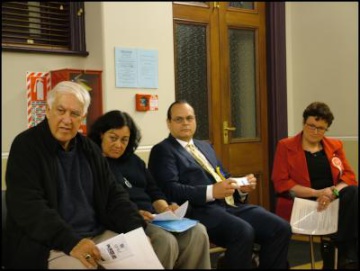
Scoop is an important research tool and a current awareness news service for those in the education sector. Scoop Analytics shows that around 10,000 unique users from the .ac.nz domain (NZ tertiary institutions domain) alone access Scoop every month and view around 30,000 pages. Many Education institutions also regularly publish press releases which are then available to our 500,000 per month readership, which includes decision-makers such as politicians, parliament, Government Departments and private sector executives.
Scoop has been a fixture of New Zealand’s news infrastructure for the education sector for over 18 years. We publish around 1000 news items per week to our main website and several sub-sites. All of this content is available to the public free of charge, indexed and searchable via search.scoop.co.nz and global search engines.
Many people take for granted that Scoop’s free stream of breaking news and public news archive will always be around. However, without the financial assistance of those using Scoop in a professional context in key sectors such as education, Scoop will not be able to continue this service.
Scoop is committed to maintaining free public access, so we have now developed what we believe is a fair way to ensure that Scoop’s future is secure - ScoopPro. We now require those whose material we publish and distribute, and those who routinely access Scoop for research, to purchase a ScoopPro license to remain within our copyright terms.
The ScoopPro professional license also includes a suite of useful information tools for professional users of Scoop including some specifically for those in the education sector to make your Scoop experience better.
>>Click to learn more about ScoopPro<<
Why it is necessary to preserve Scoop
Advertising - as a reliable means for funding our operations - dried up in 2014 with the advent of Facebook and Google as advertising channels. Scoop receives no Government grant or institutional support, and the fact that it has survived this long is testament to the tenacity of its founders, core supporters and staff. We are now facing challenges from international competitors without the same dedication to providing open public access and amplifying the voices of all New Zealanders.
Each day 210,000 Google search queries return Scoop indexed pages for searchers seeking information about a myriad of New Zealand subject matter and each month 500,000 users access the Scoop site. Scoop’s usage patterns are proof that Scoop is indeed the home of NZ’s National Debate.
We estimate that almost 50% of our coverage is not available elsewhere in the NZ media. At the end of this article are examples that demonstrate the breadth and importance of this coverage for Education sector staff, students and researchers. See Research Here
Scoop is efficient - during the working week it is far from uncommon for Beehive and other news stories to be published on Scoop hours before they appear on the Beehive Website. Also because we publish media releases they can appear as much as a day or two before the conventional media outlets have turned to content into journalist written stories. Scoop’s readers literally see the raw material that makes the news on Scoop before the mainstream media outlets turn it into mediated stories.
Scoop is a rare example of a publisher which serves the wider community democratically and does not pick and choose what we cover. We give voice not only to the education community in NZ, but also provide consistent coverage of local government, community, Pacific issues as well as other sectors and forms of news which increasingly slip through the cracks left by a decaying traditional news media industry.
Imagine for a second if you will, a New Zealand media environment which lacks Scoop as a clearing house recording in real-time and making available to all, the activities and views and work of all aspects of New Zealand society. Scoop provides a reliably curated indelible record of what was said and who said it, which is accessible to everybody on their phone. Its disappearance would leave a gaping hole in the public record archive of New Zealand and remove a valuable channel used by many.
>>Click to learn more about ScoopPro<<
ScoopPro and the Education Sector

Many academics, teachers and students as well as university and school librarians and marketing teams use Scoop extensively for research or publication. Because of its wider pool of content creators and contributors, Scoop frequently publishes news about issues that does not make it into the mainstream media. As a result, Scoop can cover the issues relevant to New Zealand’s education sector more consistently with a wider range of content and with greater frequency than other media.
This kind of unmediated coverage is no small matter for academics and education institutions in a highly competitive and fast moving society. It helps education sector organisations to stay on top of the latest developments and therefore to fulfil their primary roles of educating and acting as a check on power and a conscience to society.
Scoop provides - with a low overhead - the opportunity for education sector organisations’ news to be published directly on Scoop.co.nz. Scoop supports the work of universities in particular by helping to bring their research to the public’s attention as well as to the inboxes of important decision-makers such as politicians, parliament, Government Departments and private sector executives.
Scoop also offers a regular (daily /weekly) Education Sector Broadcast newsletter (available to all ScoopPro professional users and over 1000 non-professional scoop supporters) which summarises all the education sector related content on Scoop’s various news sites and wires and emails these to your inbox. ScoopPro allows client institutions to opt-in to receive their choice of our other Broadcast Newsletters including each NZ region, Daily Politics and 20 sector-specific offerings.
ScoopPro clients also receive an InfoPage - a homepage for your organisation on Scoop.co.nz which aggregates all your content on a page with a bio, logo and links to your website. This makes the organisation more visible and searchable on Scoop and Google and is highly useful from a Marketing and SEO perspective.
Scoop’s Comprehensive Coverage
Scoop’s coverage and archive provides a significant benefit to institutions both in promoting their research and achievements as well as providing a research and current awareness service.
An example of Scoop’s education coverage can be seen in the fact that Professor Jonathan Boston of Victoria University is referenced in 117 Scoop articles including media releases directly from the University as well as stories sourced by numerous other advocacy and political organisations on his specialist areas of child poverty, climate change and public sector governance and democracy.In contrast Professor Boston is found in other media much less frequently and the stories published date back only a few years.
The following
results show the difference.
- Scoop 117
- Stuff
53
- NBR 25
- TVNZ 0
- Maori TV 0
- Otago Daily
Times 17
- Newshub 5 (indirect search as NewsHub has no
search facility).

Why Organisations Should Support ScoopPro
ScoopPro is built upon an innovative ‘ethical paywall’ licensing model. As with most of other information suppliers we assert copyright over our published content. However the ‘public good’ aspect of our mission is “to be an agent of positive change,” and we do not want to use a content blocking paywall that would prevent the wider society from using Scoop. This is an innovative approach (although it makes our revenue generation model more challenging) and is in stark contrast to many other publishing providers who hide content from non-paying customers.
To date we have more than 180 organisations licenced as ScoopPro clients, including many government departments and law firms who find ScoopPro to offer good value and also believe in the ‘public good’ benefits of supporting the continued existence of this platform.
However, to continue to provide our important services and to make improvements and generate more original reporting and journalism on important public interest matters, we need to gain the financial support of a significant chunk of key sectors such as education.
We trust that any education sector professionals reading will either make the call to support or refer this on to the people with decision-making power to do so. We need a groundswell of champions who care about public access to information in order to ensure those making the decisions really understand what is at stake here.
>>Click to learn more about ScoopPro<<
What Does ScooPro Cost
ScoopPro is charged on a tiered system based on the number of FTE staff in each licensed organisation. The charges are very affordable considering the value gained from the associated professional News Intelligence and PR services. Discounts are available to community organisations wishing to become clients.
We believe there is a clear precedent for this request, since many educational institutions are already paying far greater sums for access to many journals from the commercial online libraries of academic publishers like Wiley, Lexis-Nexis and Proquest. Much of the content in these services is paid for by NZ tax-payers and associated costs to New Zealand’s universities are in the millions of dollars each year. However, unlike Scoop, these services and do not have the added benefit of being available at no cost to the public.
Summary
Scoop would be
delighted to welcome all Education Sector institutions or
organisations onboard as ScoopPro licenced users. We believe
they will be more than happy with the additional services
offered and will be doing their part to support a well
informed society and independent media. The ScoopPro Team is
very happy to provide any more information required to
present a proposal to a resource acquisitions committee or
board meeting.
>>You can find more information or apply now
here<<
Joseph and the ScoopPro team.
-------------------------------
Research Cases
Studies
This research into Scoop’s coverage has been conducted by Scoop Foundation Trustee Jan Rivers - a former reserach librarian (Department of Labour, Information Centre and Local Government New Zealand). Jan is working with Scoop because she believes it is an important research tool and resource for New Zealand’s democracy.
Example 1 - Professor Philippa
Howden-Chapman
Professor Philippa Howden-Chapman
of Otago University is referenced in 118 Scoop articles
dating back to 2000 including media releases directly from
Otago University as well as stories sourced by numerous
other advocacy and political organisations.
In contrast
Professor Howden-Chapman is found in other media much less
frequently and the stories published date back only a few
years. The following results show the difference:
- Scoop
118
- Stuff 80-100
- TV3 0
- TVNZ 0
- NZ Herald
37
- Otago Daily Times 36
- Māori TV 0
- NBR
7
Example 2 - Policy Tool by the
Spinoff
In the leadup to the 2017 National
Election Scoop partnered with media company The
SpinOff and Policy New Zealand on a new policy tool allowing people to compare
political party policies. This tool was powered by Scoop’s
archive of content which allowed the developers to populate
the policy positions. Policy positions were developed across
10 major categories (health, education, economy, te Ao
Māori and so on) and approximately 40 sub-categories with
straightforward information sourced directly from the
political parties’ media releases published on Scoop. This
clearly demonstrates the comprehensiveness and up-to-date
nature of Scoop’s resources.
Example 3 -
TISA
The Trade in Services Agreement (TISA) was
a trade agreement in which New Zealand was a participant in
2014. In June 2014 even before a Wikileaks leak made the
Trade in Services Agreement (TISA) visible to the rest of
the NZ media, Scoop already had eight separate stories
referencing the agreement sourced from NZ and overseas.
References in the rest of the NZ media amounted to a single
passing mention in the in the Otago Daily
Times.
Example 4 - NZME/Farifax
Merger
Earlier this year the Commerce Commission
received an application by NZME and Fairfax Media
for a proposed merger. Although the two organisations are
amongst NZ’s biggest media organisations they cited 9
Scoop Media articles - more than from any other media
organisation including the participants themselves - to
describe and support their case.
Example 5 - Sir
Geoffrey Palmer Speech
Sir Geoffrey Palmer made
a major speech in February 2015 on the international
legislation arrangements related to climate change. In the
rest of the online NZ media – including NBR, Stuff, the NZ
Herald and TVNZ there was not a single mention. In contrast
Scoop has published not only the press release but the
entire speech. It was regarded as so significant in the
circles of people who heard about it that I received the PDF
several times by email.
Case Study 5 - Legal Aid
Changes in 2015
In February Auckland Barrister
Frances Joychild published an important article on the Auckland
District Law Society site about the impacts of changes to
the Legal Aid system on people with civil cases and their
lawyers. The changes meant only the very poorest are now
eligible for assistance. The tales of desperation Joychild
describes are heart breaking and described our Courts being
full of with desperate people trying to represent
themselves, or worse taking the law into their own hands.
Although it was widely circulated to the media it appears no
news site published a story about this issue in the
mainstream media at the time. If it weren’t for Scoop this
story would not have gone beyond the legal community. Scoop
however published a press release on the matter.
Case Study 6 - ‘News, Renewed’
Research
The ‘News Renewed’ Study was an
innovative research study carried out by Alex Clarke at
Victoria University in 2014 on whether people would be
willing to pay for online access to news. There was no
coverage of this important story on other New Zealand news
web sites. The information was, however, published on Scoop. Incidentally, the answer to
this research question was yes – provided that the
offering and the price is attractive. Alex Clark has since
gone on to found PressPatron - a crowdfunding platform for
Journalism now being used by
Scoop.



 Eugene Doyle: Has WWIII Started?
Eugene Doyle: Has WWIII Started? Binoy Kampmark: Fencing The Ocean - Australia’s Social Media Safety Bill
Binoy Kampmark: Fencing The Ocean - Australia’s Social Media Safety Bill Binoy Kampmark: Trump, AUKUS And Australia’s Dim Servitors
Binoy Kampmark: Trump, AUKUS And Australia’s Dim Servitors Peter Dunne: Dunne's Weekly - The Wrong Answer To A Question That Does Not Exist
Peter Dunne: Dunne's Weekly - The Wrong Answer To A Question That Does Not Exist Martin LeFevre - Meditations: Perception, Conception And Beauty
Martin LeFevre - Meditations: Perception, Conception And Beauty Alastair Thompson: On The Publication Of The First NCQG Text 'New Collective Quantified Goal On Climate Finance'
Alastair Thompson: On The Publication Of The First NCQG Text 'New Collective Quantified Goal On Climate Finance'